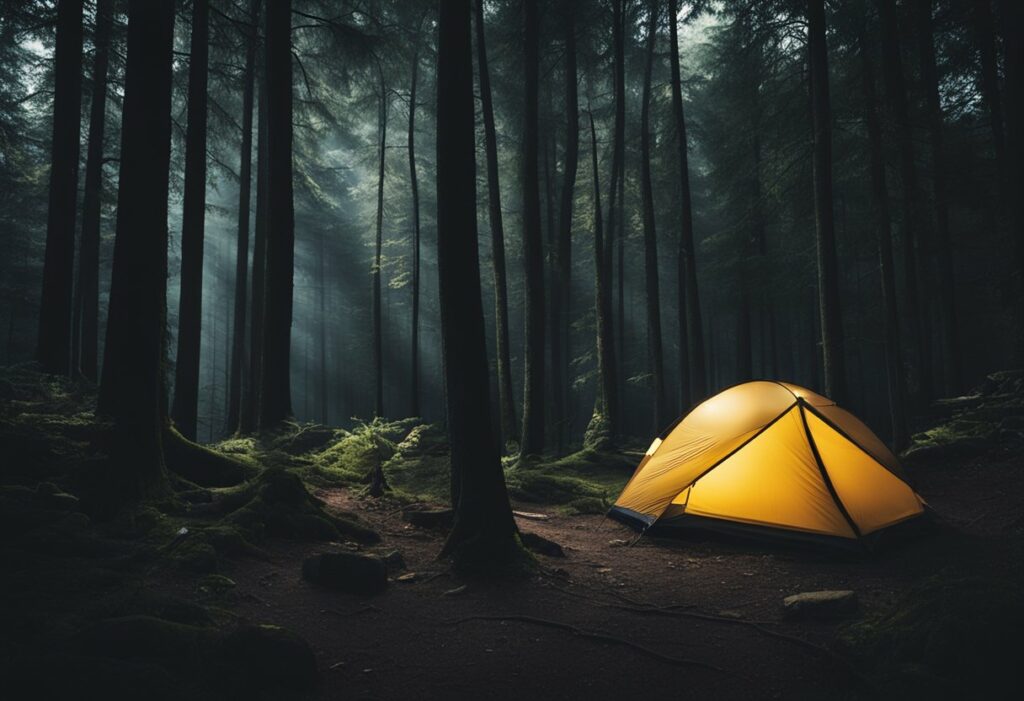We're an affiliate. We hope you love the products we recommend! Just so you know, we may collect a share of sales or other compensation from the links on this page. Thank you if you use our links, we really appreciate it!
Camping alone can be an exhilarating experience, offering you complete freedom and a unique opportunity to connect with nature on your terms. It’s a chance to step away from the noise of daily life and find solitude in the wilderness. While the appeal of solo camping is undeniable, it’s crucial to acknowledge the risks you’ll face when out in the open without companions.
When you’re in the embrace of the great outdoors, safety becomes paramount. You’re solely responsible for your well-being, and even a simple mishap can have serious consequences. From sustaining injuries like a broken limb without immediate help to facing unexpected weather conditions, the dangers are real. Venturing into the wild alone requires thorough preparation, a solid backup plan, and a good understanding of survival skills. Remember, when it’s just you against nature, every decision counts.
Understanding the Risks of Camping Alone

Embarking on a solo camping trip can offer a unique sense of freedom and self-discovery. However, it’s crucial to recognize and prepare for the inherent dangers that come with being alone in the wilderness.
Wildlife Encounters
While encountering wildlife is a part of camping, it’s essential to know how to handle a face-to-face with dangerous animals. Bears and snakes are among those that necessitate caution. Carrying bear spray and remaining vigilant can help you avoid or defend against attacks.
Potential for Getting Lost
Even the most experienced campers can lose their way. Always carry a compass and a map of the area, and ensure you stick to marked trails. Trust your instincts, but don’t dismiss the importance of preparation and orientation tools.
Health Emergencies
From injuries to sudden illnesses, a first aid kit is a non-negotiable item in your pack. Understand basic treatments for cuts, hypothermia, or dehydration. Knowledge of first aid can be as crucial as the tools themselves.
Emotional Challenges
Loneliness can be overwhelming when you’re isolated, and the emotional challenge is often underestimated. Prepare mentally for the solitary nature of your trip, allowing alone time to be an opportunity for self-discovery rather than a hurdle.
Environmental Hazards
Weather can shift unexpectedly, leading to storms or extreme temperatures. Adhering to Leave No Trace principles improves safety and conservation. Always check the forecast and carry appropriate gear to protect against the elements.
Equipment Failure
Your gear is your lifeline. A headlamp or flashlights are essential as darkness falls. Regularly check your equipment, and understand how to repair or replace crucial items to mitigate the inconvenience or danger of equipment failure.
Solo Camping Safety Tips

Embarking on a solo camping adventure requires meticulous planning and a high degree of self-reliance. From dealing with unexpected wildlife encounters to mitigating the risk of injury, the following tips serve as a guide to keep you safe.
Handling Wildlife
Your safety starts with respecting the wildlife around you. Knowledge is power, and understanding the dangers each animal poses is crucial.
- Keep a distance: Always observe wildlife from afar to avoid provoking them.
- Store food properly: Use bear-proof containers or hang your food high in a tree to prevent attracting animals.
- Carry bear spray: Have it readily accessible—not buried in your pack—in case of an encounter.
Avoiding Injury and Illness
The freedom of camping alone also comes with the responsibility for your well-being.
- First aid: Bring a kit tailored to your destination’s specific hazards.
- Plan ahead: Know the terrain and weather forecast to avoid hazardous areas.
- Stay hydrated and nourished: Monitor your water intake and keep nutritious meals handy.
Building Awareness and Trusting Instincts
Heightened awareness and trusting your instincts can be your best allies in the wild.
- Be mindful of surroundings: Regularly scan your environment for potential hazards.
- Listen to your gut: If a situation feels wrong, don’t second-guess pulling back or seeking help.
The Role of Self Defense
Equip yourself with tools and skills that enhance your protection.
- Self-defense tools: Carry pepper spray or a knife for emergency situations.
- Decision-making: Identify threats quickly and decide the appropriate course of action, be it de-escalation or defense.
Frequently Asked Questions
When camping alone in the wilderness, it’s crucial to stay informed about the potential risks and to prepare accordingly. Equip yourself with knowledge and gear that prioritize your safety.
What safety precautions should one take when camping alone in the wilderness?
Before heading out, inform someone of your plans and estimated return time. Always bring a map, compass, or GPS device, and know how to use them. Carry a first aid kit, enough food and water, and emergency shelter. Be aware of the weather and pack suitable clothing. Learn basic survival skills such as fire-making, signaling for help, and finding safe drinking water.
How can a solo camper effectively manage risks associated with wildlife encounters?
Educate yourself on the types of wildlife you might encounter and their behavior. Store food in bear-proof containers or suspended between trees. Make noise while hiking to avoid startling animals. Carry bear spray, know how to use it, and keep it accessible. Never approach or feed wild animals.
What strategies can be employed to ensure personal security when camping alone in remote areas?
Choose a campsite with good visibility and avoid setting up near trails where you’re not easily seen. Be discreet about your solo status if encountering strangers. Lock your vehicle and secure valuables. Consider bringing a personal locator beacon (PLB) or satellite messenger as a lifeline to emergency services.
Can camping in solitude increase the chance of medical emergencies, and how should they be handled?
Solo camping can delay assistance in case of an injury. Take a wilderness first aid course to learn how to handle emergencies yourself. Always have a well-stocked first aid kit and know how to use everything in it. If injured, stay calm, assess the situation, apply first aid, and use a PLB or phone to call for help if necessary.
How do experienced solo campers prepare differently when planning to camp in isolated locations?
Experienced solo campers often have a heightened awareness of their environment. They typically pack more strategically, carrying only what is necessary but including redundancies for critical items like fire starters and water purification methods. They tend to have a deeper knowledge of navigation and survival techniques and are more practiced in self-reliance and decision-making skills.

We’re passionate about getting the most from your car when it comes to going on adventures and road trips. When you take one of these trips you often need more room in your car than you usually would. This is when we come in, to help you find the best roof tent for your car and needs.

